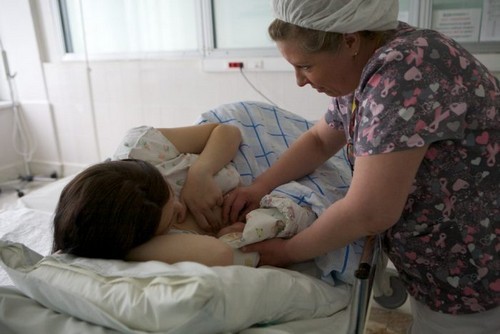Pathology has many similarities with normal depression, but it has distinctive symptoms:
- constant alarm condition;
- pessimism;
- insomnia;
- tearfulness;
- unwillingness to seek help;
- feeling lonely
Postpartum depression has physiological signs:
- lack of appetite;
- shortness of breath, palpitations;
- dizziness.
How to fight at home
Depression can be mild and go away after 2-3 weeks, or it can take up to 1.5 years or develop into a postpartum psychosis. The latter cannot pass by itself, a specialist is required for its treatment. In order to prevent postpartum psychosis, depression should be treated.

The signs that depression has been delayed will be indicated by:
- condition does not pass after 2-3 weeks;
- difficult to care for a child;
- there are obsessive thoughts about harming the baby;
- I want to hurt myself.
Disorder does not pass without a trace for the child. Children whose mother suffered from postpartum depression show less positive emotions and show sluggish interest in the world around them.
Treatment of postpartum depression can occur at home without a specialist in one of several ways.
Change your lifestyle
It is necessary to adjust the mode of the day: do morning exercises, walk more with the child in the fresh air.
Limit your diet to healthy food, eat at the same time and give up alcohol. Young mothers should try to get enough sleep in any way: if this fails at night, then you need to find time during the day when the baby is sleeping.
Become more confident
Get rid of the “contrived” plots of how a young family should look like. No need to be on someone, each person is individual.
Ask for help
The big mistake of young mothers is not to ask for help and to take on all the duties of caring for the child, the husband and the house for yourself. In order not to provoke mental disorders, you need to give up pride and do not hesitate to ask your mother, mother-in-law and girlfriend for help.
Trust the child to her husband
A woman should be ready that a “fatherly” instinct is not laid in a man, and at first the father may not show feelings for the child. The love of a man will be manifested gradually, and the more the father cares for the child, the faster and stronger the feelings will arise. Knowing this paradox, mom should include dad in the process of caring for an infant, even if she feels that a man is doing something “wrong.”
Postpartum depression will be faster and less pronounced if you discuss everything with dad in advance. Before birth, you need to talk with your husband about new social roles and agree on the division of household responsibilities.
Reduce the requirements for yourself
Women believe that they should look after the baby, look good, clean the house and eat only homemade food. Temporarily reduce the requirements and sacrifice cleanliness in the house and manicure for well-being.
Do not sit at home
In order not to go crazy with monotony, a woman sometimes needs to be distracted. Ask your husband or mother for a few hours to sit with the child or take a walk with him, and take time for yourself: go shopping, enjoy yourself, go to visit a friend or spend the evening with your loved one.
What is postpartum depression?
Doctors call postpartum depression a form of mental disorder that develops only in women who have given birth. There are two views of psychologists: some consider her pathologies as any woman can have.
Others believe that postpartum depression is one of the manifestations of the general depressive state of a woman and occurs in those who have previously experienced depression or are hereditarily predisposed to them.
Postpartum depression should not be confused with stress, which lasts the first 3 months after the birth of a child and passes without a trace. Postpartum depression develops after 3 months and goes up to 9 months after delivery. In exceptional cases, the period can be delayed up to a year, and sometimes develop into a postpartum psychosis.
Who are prone
Postpartum depression occurs in 10–15% of women.
Deviations occur in women:
- over 40 years old;
- suffering from alcohol addiction;
- with low social status;
- with financial difficulties in the family;
- with severe pregnancy or childbirth;
- with an unwanted or sick child;
- who have no support from a spouse and relatives.
What not to do during this period
Whatever the severity of postpartum depression: moderate disorders for 2 to 3 weeks or postpartum psychosis, so as not to aggravate the situation, you can not do the following:
- forcing yourself to do business;
- self-medication;
- be treated with popular recipes, since the effect of many herbs on the body of children is not fully understood;
- neglect the rest in favor of household chores;
- withdraw into yourself.
If all methods have been tested, but there are no results, then a neurologist or psychotherapist will be able to suggest how to get out of postpartum depression.
Doctors do not cancel the above-mentioned rules, but only include drugs in therapy: antidepressants, herbs and tinctures. In advanced cases can be put in hospital.



